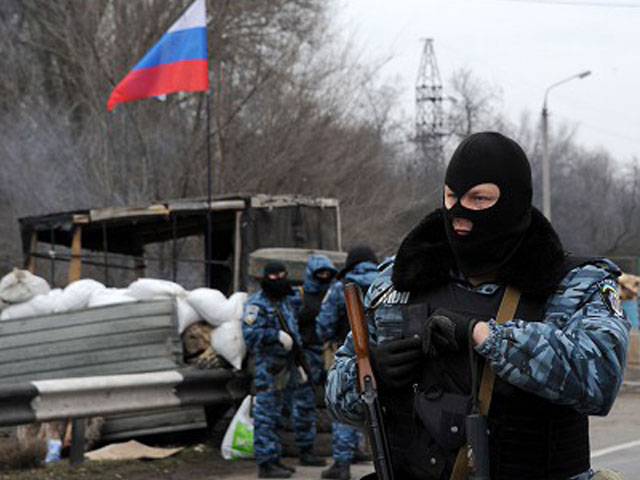DONETSK, Ukraine - Ukraine has vowed to make pro-Russian rebels pay after losing 23 servicemen in clashes across the separatist east, while Russia proposed a UN resolution demanding a ceasefire to Europe’s deadliest conflict in decades.
The Ukrainian defence ministry said Friday the death toll included 19 troops killed in a hail of rockets fired from a truck-mounted Grad rocket launcher system - a type of weapon both Kiev and Washington insist could only have been covertly supplied to the rebels by Russia. The official spokesman of Ukraine’s intensifying eastern assault added that 93 servicemen had sustained ‘wounds and contusions of varying severity’.
‘The rebels will pay for the life of every one of our servicemen with tens and hundreds of their own,’ Ukraine’s Western-backed President Petro Poroshenko told an emergency security meeting. ‘Not a single terrorist will avoid responsibility,’ he said. ‘Every single one of them will get their just desserts.’
Friday’s official toll is the highest since Poroshenko tore up a brief ceasefire with the rebels on July 1 and relaunched an offensive that managed to dislodge the militias from key eastern strongholds they had held since early April. The military separately spoke of ‘eliminating’ nearly 100 fighters in one of Ukraine’s bloodiest days since the start of the crisis last November when anti-government protests spiralled into revolution and a protracted standoff with pro-Russian rebels.
Russia meanwhile has circulated a proposal for a UN Security Council resolution calling for a ceasefire between Kiev and the pro-Moscow insurgents. Other elements of the measure would give a greater role to the Organization for Security and Cooperation in Europe, Russia’s UN ambassador Vitaly Churkin told reporters Friday. He added that the Council ‘should express deep concern about the increasing number of civilian casualties as a result of intensified combat operations.’
He also said Russia would allow OSCE monitors to be deployed at two border crossing points on its side of the frontier - a key issue for the West which claims gunmen and weapons have come into Ukraine from Russia. ‘There must be a sustainable ceasefire and then measures on the border and contacts,’ Churkin said. ‘We do not want to see a military escalation, we want deescalation.’ Russia has asked the 14 other members of the Security Council to respond by 1400 GMT Monday, although it has yet to request that the panel meet over the matter.
Two previous attempts by Moscow - caught up in a standoff with the West over the situation in Ukraine - to get the Council to agree to a text proved unsuccessful. Churkin also accused Poroshenko of using a June 20 peace plan as ‘a smoke-screen for intensifying operations in the east of the country’ against the insurgents. The tide in the eastern uprising turned last weekend when resurgent government forces managed to flush out the separatists from a string of eastern towns and cities that hold historic Russian ties. Most of the militias have since retreated to Donetsk and the neighbouring industrial city of Lugansk - both capitals of their own ‘People’s Republic’ that refuse to recognise Kiev’s new Western-leaning government and are seeking annexation by Russia.
The conflict has claimed nearly 550 lives and displaced tens of thousands across a rustbelt that had long been the economic engine of the troubled post-Soviet state. Amnesty International said on Friday it had recorded ‘hundreds’ of abductions and acts of torture committed by the separatists during the uprising. But it also noted that ‘excessive force may have been used... by Ukrainian forces’ on several occasions - a charge repeatedly made by Moscow.
The conflict has further splintered Ukraine’s culturally fractured society and left some ethnic Russians feeling marginalised by the more nationalistic leaders that have recently taken power.
Many have escaped across the eastern border in search of a new home. ‘Everything is shutting down,’ said a man in his fifties as he listened to the echoes of gunfire rolling in from fierce clashes being waged on Friday morning outside Donetsk International Airport.
‘There is nothing to do here. No work - and it is getting too dangerous,’ he said. Poroshenko now finds himself trapped between European pressure to agree an immediate truce and massive domestic support for his troops to finish off an insurgency that has threatened the 45-million-strong nation with disintegration and economic collapse. Germany and France have been spearheading EU efforts to secure a truce and win promises from the Kremlin to stop meddling in Ukraine. They hope to avoid further European sanctions on Russia that might damage their energy and financial ties with Moscow. But they have found Poroshenko - boosted by recent successes on the battlefield and bound by promises made at the May election - looking increasingly unwilling to call off the offensive.
Friday, April 19, 2024
Ukraine vows to strike back after rebels kill 23 troops

Caption: Ukraine vows to strike back after rebels kill 23 troops
8:27 AM | April 19, 2024
8:09 AM | April 19, 2024
No damage to Iranian nuclear sites after Israeli airstrikes, says UN nuclear watchdog
12:50 PM | April 19, 2024
Ch Shafay visits Directorate of Consumer Protection Council
April 19, 2024
ECP reviews arrangements for by-elections in Punjab
April 19, 2024
Punjab’s price control initiative: A welcome step
12:33 PM | April 19, 2024
A Tense Neighbourhood
April 19, 2024
Dubai Underwater
April 19, 2024
X Debate Continues
April 19, 2024
Hepatitis Challenge
April 18, 2024
IMF Predictions
April 18, 2024
Kite tragedy
April 19, 2024
Discipline dilemma
April 19, 2024
Urgent plea
April 19, 2024
Justice denied
April 18, 2024
AI dilemmas unveiled
April 18, 2024
ePaper - Nawaiwaqt
Advertisement
Nawaiwaqt Group | Copyright © 2024





